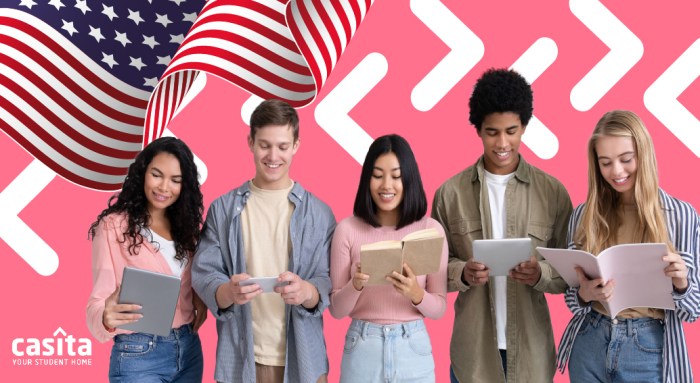Embark on an extraordinary adventure with American university exchange programs, where cultural immersion, academic growth, and personal transformation intertwine. Discover the world beyond your campus and immerse yourself in diverse cultures while earning academic credits.
From the bustling streets of New York City to the tranquil landscapes of California, American universities offer a myriad of exchange programs tailored to your interests and aspirations. Join a vibrant community of international students and experience the American education system firsthand.
Popular Exchange Programs
American university exchange programs offer students a unique opportunity to experience a different culture, learn about a new educational system, and make lifelong friends. There are many different exchange programs available, each with its own unique features and benefits. Here are some of the most popular American university exchange programs:
The Fulbright Program
The Fulbright Program is the U.S. government’s flagship international educational exchange program. It was established in 1946 by Senator J. William Fulbright to promote mutual understanding between the United States and other countries. The Fulbright Program offers grants to students, scholars, teachers, and professionals to study, teach, or conduct research in over 160 countries.
- Key features: The Fulbright Program is a highly competitive program that offers a wide range of opportunities for students and scholars. Grants can be used to fund study, research, or teaching in any field. The program also provides participants with opportunities to travel and learn about the host country.
- Benefits: The Fulbright Program offers a number of benefits to participants, including:
- Financial support: Fulbright grants cover the cost of tuition, travel, and living expenses.
- Academic enrichment: Fulbright grants provide participants with the opportunity to study and research at top universities and institutions around the world.
- Cultural immersion: Fulbright grants allow participants to experience a different culture and learn about a new educational system.
- Professional development: Fulbright grants provide participants with the opportunity to develop their professional skills and knowledge.
- Eligibility requirements: To be eligible for a Fulbright grant, applicants must be U.S. citizens or permanent residents and have a bachelor’s degree or equivalent. Applicants must also have a strong academic record and be able to demonstrate their commitment to the Fulbright Program’s goals.
- Application deadlines: The application deadline for the Fulbright Program varies depending on the country and program. However, most applications are due in the fall of the year preceding the start of the program.
Benefits of Participating in an Exchange Program

Participating in an exchange program offers numerous academic and personal benefits that can positively impact students’ lives. Research has consistently shown that exchange students experience significant growth in various areas.
Academic Benefits
Exchange programs provide students with the opportunity to immerse themselves in a different educational system and gain exposure to new teaching methodologies, research facilities, and academic resources. This exposure broadens their intellectual horizons, enhances their critical thinking skills, and deepens their understanding of diverse perspectives. Studies have shown that exchange students often achieve higher GPAs and have greater success in graduate school and professional careers.
Personal Benefits
Beyond academic gains, exchange programs offer invaluable personal benefits. Students who participate in exchange programs develop increased cultural awareness, adaptability, and self-confidence. They learn to navigate unfamiliar environments, interact with people from different backgrounds, and overcome challenges that arise from living in a foreign country. These experiences foster independence, resilience, and a greater appreciation for different cultures.
Examples of Successful Exchange Students
Numerous successful exchange students have shared their transformative experiences. For instance, Sarah, an exchange student from the United States who studied in Spain, credits her exchange program with helping her become more confident in her Spanish language skills and gaining a deeper understanding of Spanish culture. She also developed close friendships with her host family and fellow students, which enriched her overall experience.
Cultural Immersion and Understanding
Immersing yourself in a new culture is an integral part of an exchange program. It allows you to experience the host country’s way of life firsthand, gain a deeper understanding of its people, and challenge your own perspectives.
To fully engage with the host culture, make an effort to step outside your comfort zone and interact with locals. Attend cultural events, visit local markets, and try traditional cuisine. Be open to learning about the history, customs, and beliefs of the host country. Respect local traditions and customs, even if they differ from your own.
Cultural exchange is a transformative experience that can broaden your horizons, foster empathy, and create lasting memories. It helps you develop a more nuanced understanding of the world and your place in it.
Tips for Engaging with the Host Culture
– Make an effort to learn basic phrases in the local language.
– Be respectful of local customs and traditions.
– Attend cultural events and festivals.
– Visit local markets and interact with vendors.
– Try traditional cuisine and explore the local food scene.
– Seek opportunities to interact with locals and make friends.
– Be open to new experiences and perspectives.
Challenges and Considerations

Participating in an exchange program can be an incredibly rewarding experience, but it’s essential to be aware of potential challenges and plan accordingly.
Language Barriers
Language barriers are a common challenge faced by exchange students. Students may encounter difficulties understanding lectures, completing assignments, and communicating with locals.
– Strategies for Overcoming:
– Take language classes before and during the exchange program.
– Immerse yourself in the local language by watching movies, listening to music, and reading newspapers.
– Don’t be afraid to ask for help from professors, classmates, or language partners.
Cultural Differences
Cultural differences can also pose challenges. Students may experience different customs, social norms, and values.
– Strategies for Overcoming:
– Research the host country’s culture before departure.
– Be open-minded and respectful of different perspectives.
– Seek opportunities to interact with locals and learn about their way of life.
Financial Constraints
Exchange programs can be expensive, and students may face financial constraints.
– Strategies for Overcoming:
– Apply for scholarships and financial aid.
– Create a budget and track expenses carefully.
– Consider working part-time during the exchange program.
Selecting the Right Program

Choosing the most suitable exchange program is essential for a fulfilling experience. Consider your aspirations, interests, and financial situation when selecting a program. Duration, location, academic focus, and cost are key factors to consider.
Program Duration
Exchange programs range from short-term (a few weeks) to long-term (an academic year or more). Short-term programs provide a brief glimpse into a different culture, while long-term programs offer deeper immersion and academic integration.
Location
Consider the country and city where you want to study. Factors to consider include language, culture, climate, and cost of living. Research different locations to find one that aligns with your interests and comfort level.
Academic Focus
Choose a program that aligns with your academic interests and goals. Some programs focus on language acquisition, while others offer coursework in specific disciplines or provide research opportunities. Ensure the program offers courses that complement your major or career aspirations.
Cost
Exchange programs vary in cost, including tuition, accommodation, and living expenses. Research and compare program fees, considering the duration and location. Explore financial aid options such as scholarships or grants to reduce the financial burden.
| Program | Duration | Location | Academic Focus | Cost |
|---|---|---|---|---|
| Program A | Semester | London, UK | English Language and Literature | $15,000 |
| Program B | Year | Tokyo, Japan | Japanese Language and Culture | $20,000 |
| Program C | Summer | Paris, France | Art and Design | $8,000 |
Query Resolution
What are the eligibility requirements for American university exchange programs?
Eligibility requirements vary depending on the program and university. Generally, students must be in good academic standing, have a strong GPA, and demonstrate proficiency in English.
How long do American university exchange programs typically last?
Program duration varies, ranging from a few weeks to a full academic year. Some programs also offer the option to extend your stay.
Can I receive academic credit for participating in an American university exchange program?
Yes, most exchange programs allow students to earn academic credits that can be transferred back to their home university.




